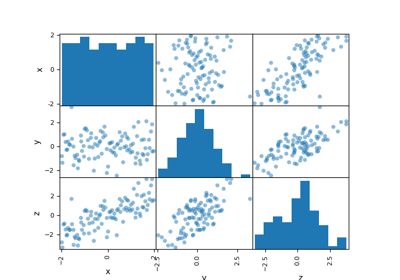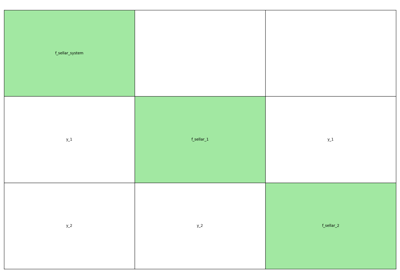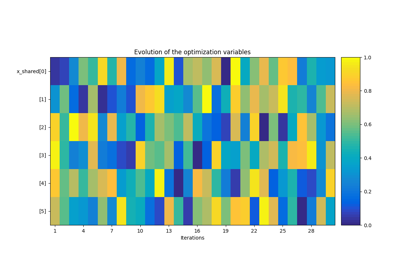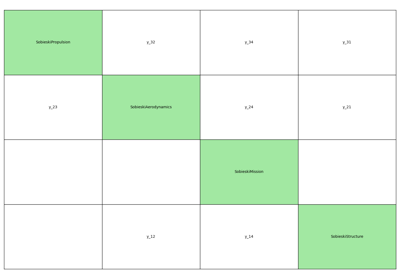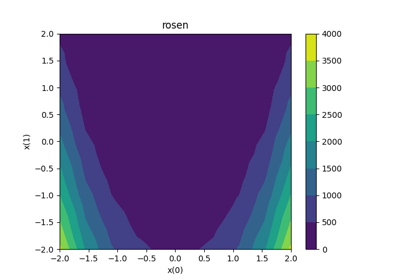optimization_dataset module¶
A Dataset to store optimization histories.
- class gemseo.datasets.optimization_dataset.OptimizationDataset(data=None, index=None, columns=None, dtype=None, copy=None, *, dataset_name='')[source]¶
Bases:
DatasetA
Datasetto store optimization histories.Warning
A
Datasetbehaves like any multi-index DataFrame but its instantiation using the constructordataset = Dataset(data, ...)can lead to some inconsistencies (multi-index levels, index values, dtypes, …). Hence, the construction from the dedicated methods is recommended, e.g.dataset = Dataset(); dataset.add_variable("x", data).Notes
The columns of a data structure (NumPy array,
DataFrame,Dataset, …) are called features. The features of aDatasetinclude all the components of all the variables of all the groups.Initialize self. See help(type(self)) for accurate signature.
- Parameters:
- add_constraint_group(data, variable_names=(), variable_names_to_n_components=None)[source]¶
Add the data related to the constraint group.
- Parameters:
data (DataType) – The data.
variable_names (StrColumnType) –
The names of the variables. If empty, use
DEFAULT_VARIABLE_NAME.By default it is set to ().
variable_names_to_n_components (dict[str, int] | None) – The number of components of the variables. If
variable_namesis empty, this argument is not considered. IfNone, assume that all the variables have a single component.
- Return type:
None
- add_constraint_variable(variable_name, data, components=())[source]¶
Add data related to a constraint.
- Parameters:
variable_name (str) – The name of the variable.
data (ndarray | Iterable[Any] | Any) – The data, either an array shaped as
(n_entries, n_features), an array shaped as(n_entries,)that will be reshaped as(n_entries, 1)or a scalar that will be converted into an array shaped as(n_entries, 1).components (int | Iterable[int]) –
The components considered. If empty, use
[0, ..., n_features].By default it is set to ().
- Return type:
None
- add_design_group(data, variable_names=(), variable_names_to_n_components=None)[source]¶
Add the data related to the design variable group.
- Parameters:
data (DataType) – The data.
variable_names (StrColumnType) –
The names of the variables. If empty, use
DEFAULT_VARIABLE_NAME.By default it is set to ().
variable_names_to_n_components (dict[str, int] | None) – The number of components of the variables. If
variable_namesis empty, this argument is not considered. IfNone, assume that all the variables have a single component.
- Return type:
None
- add_design_variable(variable_name, data, components=())[source]¶
Add data related to a design variable.
- Parameters:
variable_name (str) – The name of the variable.
data (ndarray | Iterable[Any] | Any) – The data, either an array shaped as
(n_entries, n_features), an array shaped as(n_entries,)that will be reshaped as(n_entries, 1)or a scalar that will be converted into an array shaped as(n_entries, 1).components (int | Iterable[int]) –
The components considered. If empty, use
[0, ..., n_features].By default it is set to ().
- Return type:
None
- add_objective_group(data, variable_names=(), variable_names_to_n_components=None)[source]¶
Add the data related to the objective group.
- Parameters:
data (DataType) – The data.
variable_names (StrColumnType) –
The names of the variables. If empty, use
DEFAULT_VARIABLE_NAME.By default it is set to ().
variable_names_to_n_components (dict[str, int] | None) – The number of components of the variables. If
variable_namesis empty, this argument is not considered. IfNone, assume that all the variables have a single component.
- Return type:
None
- add_objective_variable(variable_name, data, components=())[source]¶
Add data related to an objective.
- Parameters:
variable_name (str) – The name of the variable.
data (ndarray | Iterable[Any] | Any) – The data, either an array shaped as
(n_entries, n_features), an array shaped as(n_entries,)that will be reshaped as(n_entries, 1)or a scalar that will be converted into an array shaped as(n_entries, 1).components (int | Iterable[int]) –
The components considered. If empty, use
[0, ..., n_features].By default it is set to ().
- Return type:
None
- add_observable_group(data, variable_names=(), variable_names_to_n_components=None)[source]¶
Add the data related to the observable group.
- Parameters:
data (DataType) – The data.
variable_names (StrColumnType) –
The names of the variables. If empty, use
DEFAULT_VARIABLE_NAME.By default it is set to ().
variable_names_to_n_components (dict[str, int] | None) – The number of components of the variables. If
variable_namesis empty, this argument is not considered. IfNone, assume that all the variables have a single component.
- Return type:
None
- add_observable_variable(variable_name, data, components=())[source]¶
Add data related to an observable.
- Parameters:
variable_name (str) – The name of the variable.
data (ndarray | Iterable[Any] | Any) – The data, either an array shaped as
(n_entries, n_features), an array shaped as(n_entries,)that will be reshaped as(n_entries, 1)or a scalar that will be converted into an array shaped as(n_entries, 1).components (int | Iterable[int]) –
The components considered. If empty, use
[0, ..., n_features].By default it is set to ().
- Return type:
None
- CONSTRAINT_GROUP: Final[str] = 'constraints'¶
The group name for the constraints of an
OptimizationProblem.
- DESIGN_GROUP: Final[str] = 'designs'¶
The group name for the design variables of an
OptimizationProblem.
- FUNCTION_GROUP: Final[str] = 'functions'¶
The group name for the functions of an
OptimizationProblem.
- OBJECTIVE_GROUP: Final[str] = 'objectives'¶
The group name for the objectives of an
OptimizationProblem.
- OBSERVABLE_GROUP: Final[str] = 'observables.'¶
The group name for the observables of an
OptimizationProblem.
- property constraint_dataset: OptimizationDataset¶
The view of the constraint dataset.
- property constraint_names: list[str]¶
The names of the constraints.
Warning
The names are sorted with the Python function
sorted.
- property design_dataset: OptimizationDataset¶
The view of the design dataset.
- property design_variable_names: list[str]¶
The names of the design variables.
Warning
The names are sorted with the Python function
sorted.
- property objective_dataset: OptimizationDataset¶
The view of the objective dataset.
- property objective_names: list[str]¶
The names of the objectives.
Warning
The names are sorted with the Python function
sorted.
- property observable_dataset: OptimizationDataset¶
The view of the observable dataset.

